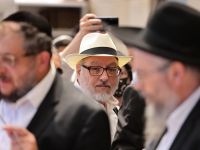Arab nations took over a UN Security Council debate on civilians in war zones, with Syria accusing Israel of genocide against Palestinians and Israel reminding Syria of the 1982 army massacre at the northern city of Hama. Meanwhile, Arab diplomats criticized the Security Council's record on the Palestinians, while Iraq sent a letter to the council accusing Iran of violating cease-fire agreement, said reports.
Syria's UN Ambassador Mikhail Wehbe was quoted by Reuters during an all-day debate Monday as saying that that Israel had exchanged "secrets and information" with Lebanon's Hizbollah guerrillas, who have launched raids against Israel for years.
"Israel and Hizbollah have an April memorandum of understanding," Wehbe said.
But Oren David, Israel's UN minister-counselor, said Syria, not Israel, had contacts with Hizbollah.
"Syria is a major supporter of Hizbollah, feeding instability along our northern borders and endangering the lives of Israeli civilians," he said.
Israel withdrew from southern Lebanon last May, but Hizbollah and Lebanon insist the occupied Shebaa farms area is part of Lebanon. The United Nations says it is part of Syria.
The Security Council held an all-day hearing about how to protect civilians in war, with two reports by Secretary-General Kofi Annan giving more than 50 recommendations and emphasizing that civilians in the past two decades were the targets of conflicts rather than accidental victims.
ARAB DIPLOMATS TELL SECURITY COUNCIL IT HAS FAILED THE PALESTINIANS
Arab diplomats to the United Nations used the debate to hammer the Security Council's record on the Palestinians, said AFP.
"This council has failed for the past six months to live up to our Arab expectations and the expectations of many member states," Egypt's ambassador to the UN, Ahmed Aboulgheit, said.
The council was debating a report by UN Secretary General Kofi Annan which contained 14 recommendations for tackling breaches of international humanitarian law, and for improving the protection of vulnerable populations.
The report noted progress made in implementing some of the 40 proposals made in an earlier report, which Annan sent to the council in September 1999.
Nasser Al-Kidwa, the Palestinian observer to the UN, told the council he was "perplexed that the two reports fail to make any mention of the Israeli occupation of the Palestinian territories or the grave and serious breaches of the fourth (1949) Geneva convention."
He agreed with Annan's observation that most conflicts today are civil wars involving irregular armies or other non-state actors.
But, Al-Kidwa said, "there can be no serious consideration of the subject of the protection of civilians in armed conflict... without giving necessary attention to the case of foreign occupation."
The Security Council could claim no credibility "when it has repeatedly failed to effectively respond to the need by Palestinian civilians for protection," he said.
In response, Israeli envoy Yehuda Lancry complimented Annan on his reports and emphasized the commitment of Jews to prevent genocide from happening anywhere in the world.
But he said that Monday's debate had deteriorated into a one-sided exchange. "One would never know it to listen to today's speakers that both Israelis and Palestinians have suffered from the current violence," he said.
Referring to Annan's denunciation of "hate speech" and "hate media," Lancry said the Palestinian press promoted cultural violence against Jews. He accused Egyptian newspapers of being "a major promoter of anti-Semitic diatribes" and said Syrian President Bashar Assad "had no scruples" about equating Israelis with Nazis
"Even his late father, Hafiz al-Assad ... never used such an unbearably heinous analogy," he said.
In his right of reply, Syria's Wehbe accused Israel of genocide, saying, "Israel must cease practicing genocide if Israel itself fears genocide."
He quoted Rabbi Ovadia Yosef, the octogenarian spiritual head of Shas, Israel's biggest ultra-Orthodox party, as calling Arabs "worse than snakes."
"Israel is built on such racist myths," Wehbe said.
Ending the verbal Ping-Pong match, David, the Israeli diplomat, said that after Israel's withdrawal from southern Lebanon last May, "Syria is the sole occupier of Lebanon."
David said Wehbe apparently forgot his own country's history of two decades of genocide, "and Hama is only one of them." He was referring to a 1982 army massacre in the central Syrian town of Hama that may have cost up to 30,000 lives.
"The Syrian representative better check his own record and selective memory before launching his baseless verbal attack," he said.
IRAQ ACCUSES IRAN OF CONTINUOUS CEASE-FIRE VIOLATIONS
In a related development, Iraq accused Iran in a letter to the Security Council of more than 60 violations of a cease-fire that the two neighbors agreed to in 1988, reported The Associated Press.
The letter, signed by Iraqi Ambassador Mohammad Al-Douri and released Monday, documents 61 incidents Iraq says occurred between Jan. 1 and March 8 that went against the 1988 UN-brokered cease-fire that ended eight years of fighting.
The allegations from Baghdad come less than a week after Iran acknowledged that its armed forces had attacked Iraqi bases of the rebel Mujahedeen Khalq. The attack killed six people and wounded 23 others, Iraqi official media and the Mujahedeen Khalq said. All but one of those casualties were Iraqis – Albawaba.com
© 2001 Al Bawaba (www.albawaba.com)







